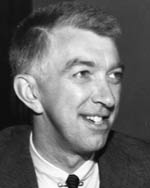
Duncan S. Ballantine
PRESIDENT 1952–54
Born on November 5, 1912, in Garden City, New Jersey
Died on December 28, 1993, in Bethesda, Maryland
Duncan S. Ballantine came to Reed in 1952, having previously worked to create core courses in the humanities at M.I.T., where he was an associate professor of history.
Succeeding E.B. MacNaughton, Ballantine aimed to focus not only on Reed’s financial soundness, but also on the college’s policies, including governance and faculty tenure and retention. In his efforts, he nullified the faculty constitution, leaving in question the role of the faculty council—a body empowered by the constitution and elected by the faculty to advise the president on matters of importance. Ballantine also pursued an active role in student affairs, particularly in the disciplining of students, which traditionally had been a function of the student council. These attempts to involve himself more fully in the daily lives of Reedites was met with resistance by many faculty members and students, who had become accustomed to the approaches of previous presidents, such as Scott, Odegard, and MacNaughton, who distanced themselves from community governance.
The tension between Ballantine and faculty members and students was further aggravated by the arrival of the Velde Committee in Portland. A subcommittee of the House Un-American Activities Committee, the committee identified three Reed professors as suspected Communist activity leaders. Ballantine suspended one of these faculty members without first consulting the faculty council; consequently, the faculty passed a motion of no confidence in the college’s president.
The faculty council investigated the charges against the three professors and found them fit to teach, but the board of trustees deemed only two of them fit, and promptly conducted an investigation of the third. Ballantine and the board broke the professor’s tenure contract and excused him from the college.
Ballantine’s struggles with the Reed community led him to resign just two years after taking the position of president and shortly after the Velde Committee hearings. He went on to serve as president of the American College for Girls in Istanbul, Turkey.